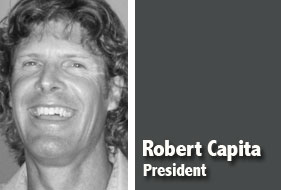 LETTER
FROM THE PRESIDENT
LETTER
FROM THE PRESIDENT
When I’m not traveling to a lab for a meeting with one of the research scientists Capita Foundation supports, or busy trying to raise money for their work, I provide a service as a sailing coach on competitive race boats. I have had a great passion for sailing yachts of all sizes for my entire life and in my later years have discovered that I can help others to become better sailors too. Communication is paramount on a race crew because the variables in the sport are constantly changing, therefore, the crew needs to know when and how much to make adjustments for the change in wind direction and wave condition, or to make a course change to avoid another yacht. The sail trimmers continually communicate with the person steering the boat, who is referred to as the skipper, to keep the yacht sailing at maximum speed and the navigator communicates with the skipper to keep the yacht on the best course. The skipper in tern will communicate with the crew to let them know how the boat is sailing, and let the crew know when certain maneuvers like significant course changes will be executed. Recently I was sailing in a race on Morton Bay in Australia, and since the wind was very light, so much that I could hear all the voices of the other crews among the 30 plus boats that started the race with us that afternoon. I found it interesting to hear all the banter, and carefully listened to the dialogue that was going on onboard our 10.3 meter yacht too. I have been fortunate to have good hearing, although, as I age, I am noticing that it is difficult to listen to conversations in large crowded areas. All is good at the moment, but what would happen if I were to suffer from significant hearing loss? I would of course have to learn to adjust to the change, but would most likely no longer be an efficient sailing coach.
Almost every CFAR grant application we receive begins with “Background,” followed by a paragraph explaining how age-related hearing loss is the number one disability as reported by the WHO, World Health Organization. Many also include that there is evidence of how hearing loss leads to isolation, depression, dementia and even Alzheimer’s. With the greatest aging population of our existence facing this fact, I’m concerned, but I am also confident that the steps that our little organization have made over the years have helped in many ways. In the time I have managed the funding of labs all over the world, I’ve learned about improvements in sound amplifying devices as well as stem-cell therapy, gene therapy and molecular therapy. There is still a long road ahead but I’m so proud to be part of the process that is continually pushing technology forward to improve lives of people that unfortunately end up with hearing a disability.
Thank you,

Robert E. Capita, President and CEO The Capita Foundation